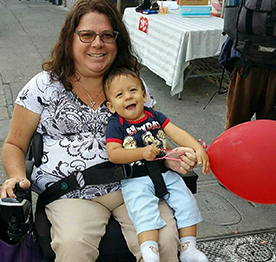TLG has conducted many research projects since its founding in 1982. The initial federal funding from NIHR in 1985 demonstrated TLG’s core “peer professional” services to families with a disability in a child or parent. It also showed how TLGs training could improve professional practice. After that, TLG’s research focused on parents with disabilities and their families due to the critical, national need for this work. Studies included those documenting the prevalence of parents with disabilities and the obstacles they experienced—addressing negative assumptions about their parenting, developing new resources for families, and supporting improved practice by professionals.
Synergy between clinical services, intervention services, and research has been integral to TLG’s development throughout the years. Our research demonstrated the effectiveness of clinical models, identified the need for practical resources, and led to additional and improved intervention. Our clinical experience led to the identification of issues needing research, guided hypotheses and methodology, and identified unserved populations as well as services gaps. (Kirshbaum & Olkin, 2002)
For instance, from 1985 to 1988 the National Easter Seal Research Foundation funded TLG’s ground-breaking research on the interaction of mothers with physical disabilities and their non-disabled babies who were not receiving services. All aspects of care were videotaped monthly from birth to toddlerhood, documenting the natural reciprocal adaptation process between mothers and babies, and the inventive solutions of the mothers. Subsequently, the video material was used to support other parents, to train professionals, and to inform TLG occupational therapists in their development of babycare adaptations.
A series of research and development projects, funded by NIDRR from 1991 to 2005, focused on developing and evaluating the impact of adaptive babycare equipment and techniques for parents with physical disabilities. This led to the development of tools and curriculum to support assessment and intervention by occupational therapists. These projects were informed by TLG’s ongoing babycare adaptation services to the community.

Numerous research projects were included in TLG’s national centers for parents with disabilities from 1993 to 2017. These included:
- TLG used video as an adaptation in services to parents with intellectual disabilities for many years. This was formalized in two studies examining the impact of Video Intervention Therapy with parents with intellectual disabilities and their young children.
- Parents with disabilities tended to be invisible in data systems identifying community needs, allocations of funding, and public policy. Therefore, a project documented national prevalence of parents with disabilities in states and counties throughout the U.S., disseminating this information on TLG’s website. In 1997, the first national survey of parents with disabilities was conducted, gathering information about obstacles experienced by 1175 mothers and fathers.
- The focus on practical obstacles facing parents with disabilities continued in TLG’s national centers, e.g., a study published in 2015 documented national barriers experienced by parents with disabilities traveling with their children on paratransit, with recommendations for improvements.
Over the years several studies addressed pathologizing attitudes regarding parents with disabilities, reflected in the literature, that were impacting national practice regarding child custody. Negative assumptions about outcomes tended to be generalized across diverse parental disabilities. For instance, it was assumed that non-disabled spouses would be “burdened,” and that children would be “parentified,” (put in an inappropriate caregiving role with their parents). A series of studies addressed these issues:
- A dissertation focused on latency age children whose mothers had physical or vision disabilities found that the children had fewer chores than is typical, since mothers worried about stressing them.
- A study focused on teamwork and role division between mothers with physical disabilities and non-disabled fathers found on average happy marital relationships and high satisfaction with roles.
- A later study articulated that it is typical for mothers without disabilities to have networks of support for care of their children, and focused on the system of care 80 mothers with physical disabilities used to manage the care of their children under three years.
- A study of 273 parents with diverse disabilities and their teenage children found a level of chores comparable to teenage children with non-disabled parents.
- A survey of 2,340 young adult children of parents with disabilities found they generally had high self-esteem. The majority reported a positive or very positive experience growing up with a parent that had a disability.
TLG has been involved with custody cases of parents with disabilities since the 1980’s. We have conducted research on child custody issues faced by parents with diverse disabilities—for instance, our research was used in a dissertation focused on the quality of parenting evaluations used in custody cases. Findings included poor overall quality of evaluations, and negative speculations about future parenting even though current parenting was adequate. An analysis of 200 of TLG’s national center’s custody technical assistance services to parents with disabilities was also conducted. Findings included attitudinal bias, and lack of disability and adaptation knowledge in family and dependency court practice in these cases. In addition, TLG reviewed a total of 400 randomly selected child welfare, dependency court cases in Los Angeles, California, Hennepin, Minnesota, and El Paso Texas counties. A key finding was that parents with disabilities were vastly over-represented, ranging from 30% to 67% of the cases.
More than 100 references to publications from TLG’s research and development projects were cited in the National Council on Disability’s 2012 landmark report, Rocking the Cradle: Ensuring the Rights of Parents with Disabilities and their Children (PDF).
See: Publications of TLG Staff and Associates (PDF)
If you are interested in purchasing one of our publications, please contact us.